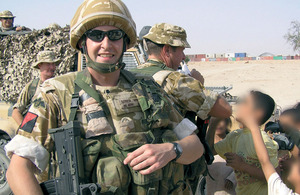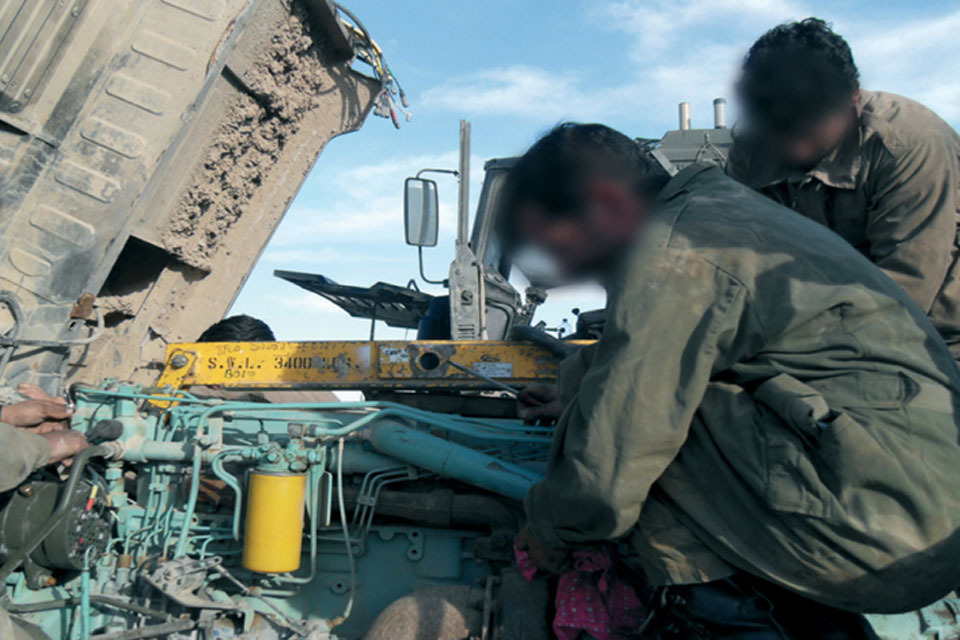HR in the Armed Forces: front line manager
How do you recruit local people in conflict zones to work for the British Army? Major Robbie Whitfield talks about a very different war for talent.

Major Robbie Whitfield meeting the recruits of the future [Picture: Crown Copyright/MOD 2010]
As the Land Forces Labour Support Staff Officer, Major Robbie Whitfield oversees the employment of up to 10,000, mostly civilian, personnel. He doesn’t get much time off. Labour support is, in essence, the HR wing concerned with the recruitment and retention of local people wherever the Armed Forces may be.
Known as locally employed civilians (LECs), posts have ranged from desk jobs in the Balkans and jungle survival instructors in Belize to interpreters on the front line in Helmand.
We are a military operation. For operations I select and put together the teams, oversee their training and deploy them as Labour Support Units [LSUs].
In theatre they report to commanders on a daily basis for operational requirements, but for HR issues they report to me at Headquarters Land Forces. I regularly visit them to monitor progress and to ensure that I am up to date,” says Major Whitfield.

Locally employed civilians are taken on for a range of jobs [Picture: Crown Copyright/MOD 2010]
LSUs are a mix of Regular Army and TA personnel. Major Whitfield is an HR and logistics specialist who first deployed to Iraq in 2003. At that time people with experience of recruiting civilians on the scale needed in Iraq were limited. So the job fell to the then 26-year-old Territorial Captain Whitfield.
In Bosnia and Kosovo, there was an established structure, an established set of regulations to work within - in Iraq there was nothing comparable and we needed to rethink how we operated because of the different environment,” says Major Whitfield.
The scale of the task in Basra was difficult to prepare for:
It was literally a case of being told to provide 650 interpreters, plus some 1,500 or so tradesmen, carpenters, welders, labourers, tailors, security staff, you name it. We were given the budget and the deadline - everything in between we had to design from scratch.
The responsibility and the decisions he faced were far greater than anything possible in civilian life. Take skills shortages, for example:
The most educated in society had either been hardline Baathists who were not inclined to assist us, were imprisoned, or killed, killed or had moved to another country. We needed to recruit from other countries in the Middle East - Egypt, Kuwait, Jordan, Syria to fill the gap with reliable educated employees.
Employing 2,000 civilians had a positive operational impact:
If all our LECs left, we would have needed to deploy an additional battle group - about 1,000 Army personnel, and the directed finance which employment injects into the local community helps establish security.
Half of the civilians recruited in Helmand work as front line interpreters - the remainder are labourers, welders, mechanics, kitchen hands and an assortment of other jobs. Security and anonymity of LECs, Major Whitfield explains, are all-important:
They are not recruited in the geographic areas that they will be working in. We don’t publicly advertise as you would in civilian life to avoid attracting infiltrators.
He doesn’t say exactly how they advertise, but individuals do come forward at pre-arranged locations:
They are typically young, in many cases quite westernised, individuals - some learn to speak English by watching Hollywood films and have American accents as a result.
The initial meeting is an informal chat, an opportunity for both parties to give each other the once-over:
They usually arrive very nervous,” says Major Whitfield.
This first meeting is about reassurance, and checking language skills. Interviews wait until the second meeting, when applicants are more relaxed.
The Army pays them well, currently around 12 times the average Afghan wage. But psychological buy-in through good employment practices is the best retention tool. Staff Sergeant Scammell, one of Major Whitfield’s many LSU operators on the ground in Helmand, describes a common problem:
Ten new LECs were due to fly down from our recruiting centre, and only eight arrived. This is a regular occurrence; the reality of the danger sometimes hits after signing the contracts.
We brief and train them extensively, and they say they understand, but that first view of a C-130 Hercules transport aircraft about to take you to a conflict zone can really make reality dawn.
Another ongoing challenge is conflicting cultural sensitivities.
On the one side, for example, the military employs female staff (“new LECs do stare,” says Major Whitfield). On the other, a woman in Afghanistan must seek her father’s permission to work. Despite proactive efforts, the civilian workforce in Afghanistan is 100 per cent male:
Our whole campaign in Afghanistan is about hearts and minds,” says Major Whitfield.
If we don’t understand the people we’re working with on the ground, then what we do can easily be misconstrued.
In order to teach soldiers about what is normal and abnormal in Afghanistan, the Army has set up a halfway house. In northern Kenya there are a number of mocked-up Afghan villages, staffed by Kenyan LECs dressed as Afghans. Around 10,000 soldiers a year do their pre-deployment training there for a month, running through a wide number of possible scenarios.
It is not meant to be an exact replica; the Kenyans speak their local language. But, Major Whitfield explains:
For some young soldiers, Kenya is their first time outside of the UK that isn’t a holiday. The arid, sparsely populated terrain of northern Kenya is in many ways similar to parts of Afghanistan. It gets the soldiers operating outside their comfort zone and thinking about population-centric operations.
The LECs, meanwhile, also require training:
For a local Afghan, it might be his first proper job, and almost definitely his first job going out on a foot patrol,” says Major Whitfield. “So we deliver a training package, teaching them things such as how to patrol and how the British Army behaves.
If an LEC really struggles to integrate with his patrol, the LSU will draft in an experienced person to act as an intermediary. It’s a balance that tends to work well.
Whether you could imagine yourself handling the intense dangers, fears and traumas of such environments is another thing altogether.
Labour support is a desk job,” Major Whitfield insists. “It’s just that the desk is in a hot and sticky place.
He can’t help smiling wryly at that one.
High-intensity HR
The work of putting together LSUs is effectively civilian HR with some military knowledge on top, according to Major Whitfield. A lot of the elements of civilian HR are there, but it’s a lot more intense and basic.
**Industrial relations
**We ask LECs to go into a high threat environment. When interpreters, who make up about 50 per cent of our workforce, say I don’t want to go on patrol any more, then we have an industrial relations issue in its rawest form, says Major Whitfield.
Parallels with civilian HR
Major Whitfield was involved in the withdrawal of British forces from Kosovo and had to make redundancies. Fifty per cent of our personnel were LECs. Many had been employed since 1999. We only had about three months’ notice of the closure, but most of the planning had been done, redundancy calculations made, letters printed in Albanian, Serbian, English, and funding was allocated. It was sad making the workforce redundant; unemployment runs at 57 per cent in Pristina. But we gave them a good package, and with our help, of those made redundant, 67 per cent were employed within two months of leaving.
**This is an edited version of an article by Tim Smedley, first published in People Management - the magazine of the Chartered Institute of Personnel and Development. **